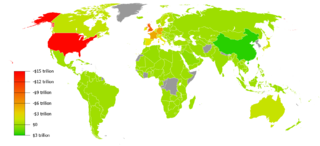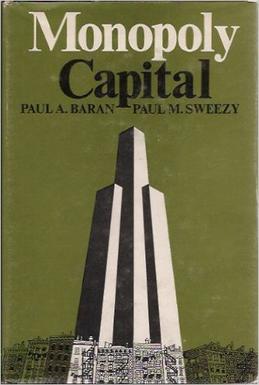
In international economics, the balance of payments of a country is the difference between all money flowing into the country in a particular period of time and the outflow of money to the rest of the world. In other words, it is economic transactions between countries during a period of time. These financial transactions are made by individuals, firms and government bodies to compare receipts and payments arising out of trade of goods and services.

Bruegel is a think tank devoted to policy research on economic issues. Based in Brussels, it launched its operations in 2005 and currently conducts research in five different focus areas with the aim of improving economic debate and policy-making.

In economic policy, austerity is a set of political-economic policies that aim to reduce government budget deficits through spending cuts, tax increases, or a combination of both. There are three primary types of austerity measures: higher taxes to fund spending, raising taxes while cutting spending, and lower taxes and lower government spending. Austerity measures are often used by governments that find it difficult to borrow or meet their existing obligations to pay back loans. The measures are meant to reduce the budget deficit by bringing government revenues closer to expenditures. Proponents of these measures state that this reduces the amount of borrowing required and may also demonstrate a government's fiscal discipline to creditors and credit rating agencies and make borrowing easier and cheaper as a result.
In international law, odious debt, also known as illegitimate debt, is a legal theory that says that the national debt incurred by a despotic regime should not be enforceable. Such debts are, thus, considered by this doctrine to be personal debts of the government that incurred them and not debts of the state. In some respects, the concept is analogous to the invalidity of contracts signed under coercion. Whether or not it is possible to discharge debts in this manner is a matter of dispute.

Ricardo Hausmann is the former Director of the Center for International Development currently leading the Center for International Development's Growth Lab and is a Professor of the Practice of Economic Development at the John F. Kennedy School of Government at Harvard University. He is also a former Venezuelan Minister of Planning and former Head of the Presidential Office of Coordination and Planning (1992–1993). He co-introduced several regularly used concepts in economics including original sin, growth diagnostics, self-discovery, dark matter, the product space, and economic complexity.

Barry Julian Eichengreen is an American economist and economic historian who is the George C. Pardee and Helen N. Pardee Professor of Economics and Political Science at the University of California, Berkeley, where he has taught since 1987. Eichengreen is a research associate at the National Bureau of Economic Research and a research fellow at the Centre for Economic Policy Research.

Mark Alan Weisbrot is an American economist and columnist. He is co-director with Dean Baker of the Center for Economic and Policy Research (CEPR) in Washington, D.C. Weisbrot is President of Just Foreign Policy, a non-governmental organization dedicated to reforming United States foreign policy.

Simeon Dyankov is a Bulgarian economist. From 2009 to 2013, he was the deputy prime minister and minister of finance of Bulgaria in the government of Boyko Borisov. He has been a vocal supporter of Bulgaria's entry into the Eurozone. Before his cabinet appointment, he was the chief economist of the finance and private sector vice-presidency of the World Bank.

Monopoly Capital: An Essay on the American Economic and Social Order is a 1966 book by the Marxian economists Paul Sweezy and Paul A. Baran. It was published by Monthly Review Press. It made a major contribution to Marxian theory by shifting attention from the assumption of a competitive economy to the monopolistic economy associated with the giant corporations that dominate the modern accumulation process. Their work played a leading role in the intellectual development of the New Left in the 1960s and 1970s. As a review in the American Economic Review stated, it represented "the first serious attempt to extend Marx’s model of competitive capitalism to the new conditions of monopoly capitalism." It attracted renewed attention following the Great Recession.

José De Gregorio Rebeco is a Chilean economist, academic, researcher, consultant and politician. He has been the Governor of the Central Bank of Chile, Minister of the Economy, Mining and Energy during the administration of Ricardo Lagos and is currently the Dean of the School of Economics and Business of the Universidad de Chile. He is also a nonresident Senior Fellow at the Peterson Institute for International Economics.
A sovereign default is the failure or refusal of the government of a sovereign state to pay back its debt in full when due. Cessation of due payments may either be accompanied by that government's formal declaration that it will not pay its debts (repudiation), or it may be unannounced. A credit rating agency will take into account in its gradings capital, interest, extraneous and procedural defaults, and failures to abide by the terms of bonds or other debt instruments.

Beatrice Weder di Mauro is a Swiss economist who is currently Professor of economics at the Graduate Institute of International and Development Studies in Geneva, Research Professor and Distinguished Fellow-in-residence at the Emerging Markets Institute of INSEAD Singapore, and senior fellow at the Asian Bureau of Finance and Economic Research (ABFER). Since 2018, she also serves as President of the Centre for Economic Policy Research (CEPR).

Markus Konrad Brunnermeier is an economist, who is the Edwards S. Sanford Professor of Economics at Princeton University.
Original sin is a term in economics literature, proposed by Barry Eichengreen, Ricardo Hausmann, and Ugo Panizza in a series of papers to refer to a situation in which "most countries are not able to borrow abroad in their domestic currency."
Fear of floating refers to situations where a country prefers a fixed exchange rate to a floating exchange rate regime. This is more relevant in emerging economies, especially when they suffered from financial crisis in the last two decades. In foreign exchange markets of the emerging market economies, there is evidence showing that countries who claim they are floating their currency, are actually reluctant to let the nominal exchange rate fluctuate in response to macroeconomic shocks. In the literature, this is first convincingly documented by Calvo and Reinhart with "fear of floating" as the title of one of their papers in 2000. Since then, this widespread phenomenon of reluctance to adjust exchange rates in emerging markets is usually called "fear of floating". Most of the studies on "fear of floating" are closely related to literature on costs and benefits of different exchange rate regimes.
Claudia Maria Buch is a German economist who currently serves as served as Chair of the ECB Supervisory Board since 2024. She previously was a Vice President of the Bundesbank from 2014 to 2023.
"Too Much Finance?" is a scholarly paper by Jean-Louis Arcand, Enrico Berkes, and Ugo Panizza. The paper was originally described in a 2011 VoxEU column, in 2012 it was issued as IMF working paper, and in 2015 was published by the Journal of Economic Growth.

The Centre for Finance and Development (CFD) is an interdisciplinary research centre at the Graduate Institute of International and Development Studies which is housed at the Maison de la paix in Geneva. The Centre is staffed by several prominent economists such as: director Nathan Sussman, deputy-director Ugo Panizza, Lore Vandewalle, Cédric Tille, and Charles Wyplosz.
The Latin American and Caribbean Economic Association (LACEA) is an international association of economists with common research interests in Latin America. It was founded in July 1992, to encourage professional interaction and foster increased dialogue among researchers and practitioners whose work focuses on the economies of Latin America and the Caribbean. Since 1996, its Annual Meetings bring together scholars, practitioners and students to discuss research papers and listen to invited keynote speakers who present the latest academic findings in economic and social development issues. LACEA fosters several thematic research networks, publishes the academic journal Economia, and administers the digital repository LACER-LACEA.
Ṣebnem Kalemli-Özcan is an economist and the Neil Moskowitz Professor of Economics and Finance at the University of Maryland, College Park. She is a co-editor of the Journal of International Economics, on the board of editors of the American Economic Review, an associate editor of the Journal of the European Economic Association and an associate editor of the Journal of Development Economics. She is a research fellow at the NBER and CEPR.










